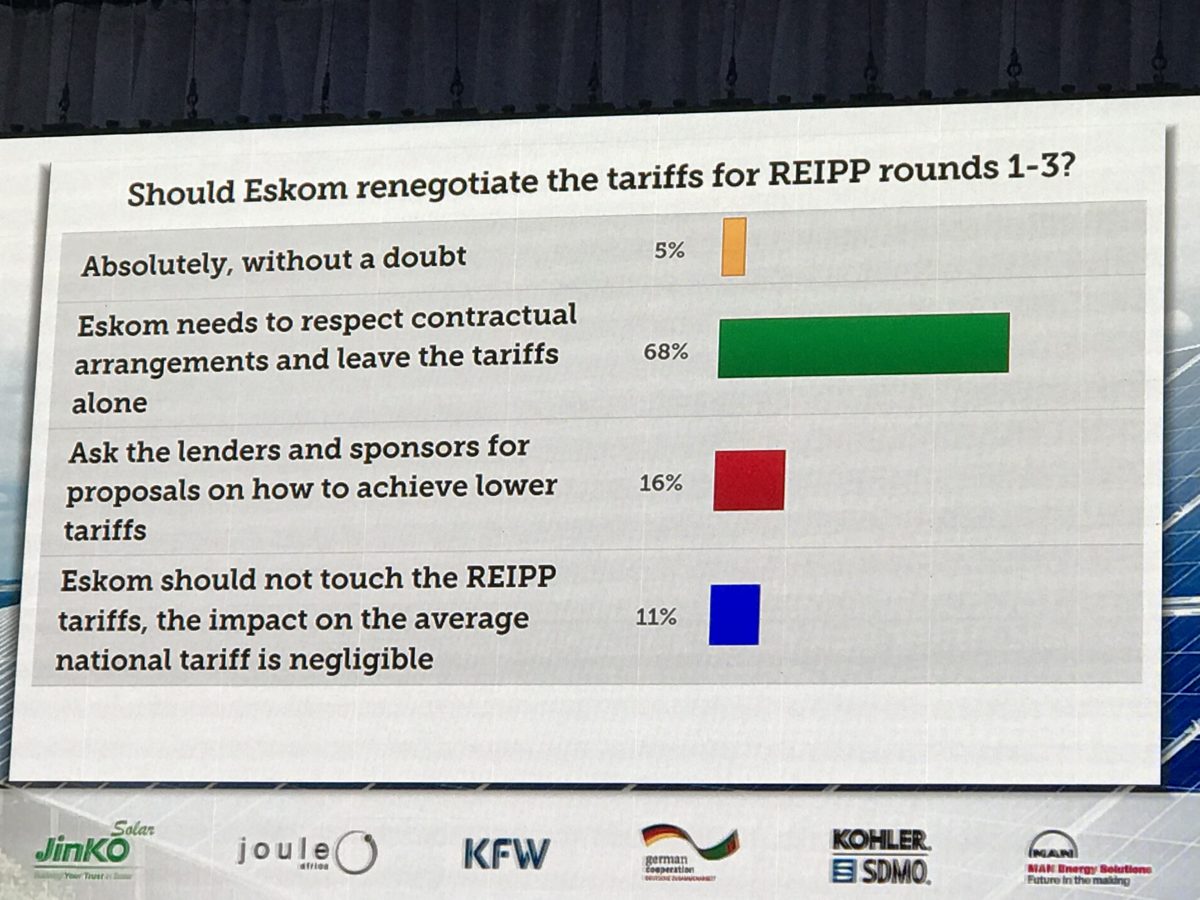A representative of South Africa’s energy regulator has told delegates at the Africa Energy Forum (AEF), power purchase agreements (PPAs) signed in the opening three rounds of the nation’s renewables incentive program must be retroactively renegotiated.
Nomfundo Maseti, of the National Energy Regulator of South Africa, told a panel discussion at the event in Lisbon yesterday the financial crisis at national utility Eskom meant contracts signed with renewable energy project developers between 2011 and 2013 must be torn up.
Whilst she did not explicitly link the launch of the next, fifth round of the Renewable Energy Independent Power Producer Procurement Program (REIPPPP) to renegotiation of the earlier contracts, Maseti made clear the next round of the renewables incentive scheme was ready to go and her preference was to find a solution to the crisis at Eskom in order to move clean energy development forward.
PPA contracts stemming from the fourth round of the REIPPPP have already been renegotiated, albeit before the original agreements had been signed off.
A live poll of delegates at the panel discussion asking whether Eskom should renegotiate the tariffs for rounds 1-3 of the REIPPPP, showed 68% of voters wanted Eskom “to respect contractual arrangements and leave the tariffs alone”.
PPA contract extension
Eskom’s financial crisis will prompt further government interventions, Anton Eberhard of the Graduate School of Business at the University of Cape Town, told the AEF. The professor told the panel Eskom’s troubles would need an innovative solution, perhaps by lowering PPA tariffs in tandem with an extension of the duration of the agreements.
Eberhard said Eskom is expected to “post a record loss of at least R25 billion [$1.7 billion] in fiscal year 2019”. That bleak situation, he said, renders the business “effectively insolvent” despite “a more than 500% increase in tariffs since 2007”.
Popular content
Despite the escalating crisis, said the Cape Town professor, extortionate coal contracting and payroll costs continue to be paid by the power company. Eberhard highlighted massive time and cost overruns at the Medupi and Kusile coal plants and the Ingula pumped hydro power station as the main causes for Eskom’s travails.
The Medupi and Ingula power stations were commissioned in 2015 and 2017, respectively. The Kusile plant is only partly operational, with the biggest part of the project still under construction. All three facilities face controversial rising costs, and corruption connected to their construction contracts is widely suspected to be at the root of the problem.
As a result, the state owned utility is not generating enough revenue to service interest and principal payments and is borrowing at expensive rates to service its debts, inflating an already dire gearing ratio.
Unbundling Eskom
The AEF panel discussed the case for unbundling Eskom’s generation, transmission and distribution business segments in order to potentially privatize any or all of them.
The separation plan received strong backing from delegates in another live poll held during the discussion with half the votes supporting privatization of all the units, 44% agreeing with privatization of only the generation and distribution businesses and the remaining 6% voting to separate the businesses but keep them publicly owned.
This content is protected by copyright and may not be reused. If you want to cooperate with us and would like to reuse some of our content, please contact: editors@pv-magazine.com.


1 comment
By submitting this form you agree to pv magazine using your data for the purposes of publishing your comment.
Your personal data will only be disclosed or otherwise transmitted to third parties for the purposes of spam filtering or if this is necessary for technical maintenance of the website. Any other transfer to third parties will not take place unless this is justified on the basis of applicable data protection regulations or if pv magazine is legally obliged to do so.
You may revoke this consent at any time with effect for the future, in which case your personal data will be deleted immediately. Otherwise, your data will be deleted if pv magazine has processed your request or the purpose of data storage is fulfilled.
Further information on data privacy can be found in our Data Protection Policy.